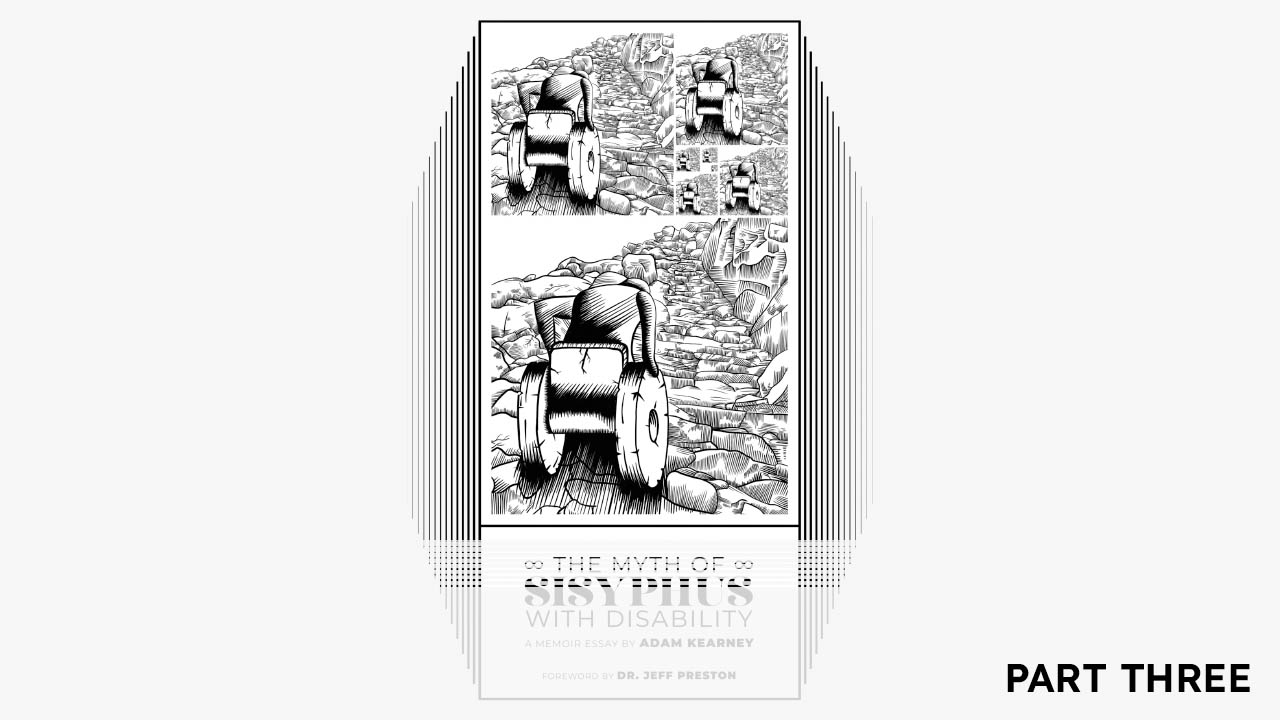The Myth of Sisyphus with Disability: Part Three
 CREDIT: COURTESY OF ADAM KEARNEY
CREDIT: COURTESY OF ADAM KEARNEYThis article is Part Three in a series of excerpts from Fanshawe grad Adam Kearney’s essay, The Myth of Sisyphus with Disability.
Around this time, a friend who knows I am going through a rough time sent me a link wanting to know what I thought about it. The title was Disability Inclusion Imperative (the white paper), and I believe Adecco’s (a staffing agency) intention was to improve disability representation in the workforce. The more I read, the more I understood how deeply entrenched ableism is in our capitalist society. The opening lines read “Persons with disabilities are too often missed from companies’ hiring and inclusion agendas,” and “mining untapped talent pools for great permanent hires.” It only got worse from there:
“What if we told you that a huge, growing talent pool — brimming with innovative potential — is being overlooked by many employers, even during today's labour crisis? What if we told you that this group has been reported to have average retention rates of 85 per cent after one year of employment? And that some companies with this group well represented on their workforce enjoy 28 per cent higher revenues. 2x higher net income. and 30 per cent higher profit margins?”
But wait! There’s more!
“With the pandemic prompting people to re-evaluate their careers, we believe employers must capitalize on the Great Resignation to reimagine the composition of their workforces. It’s time to rethink outdated hiring processes, reach out to under-represented populations, and capture that highly skilled and overlooked talent for long-term success.”
Not only does the piece sound like they are selling people with disability as ripe for exploitation, it also suggests using us as scab workers. It stops short of saying “they will just be happy to have a job,” which I have heard far too often already.
Let me throw some numbers around to add some context as to why these statements are so alarming. The University of Toronto published a piece in 2020 stating:
“Many also live in poverty — as high as nearly 30 per cent, according to the Statistics Canada data. Only 59.4 per cent of Canadians with disabilities were employed in 2015, compared to 80.1 per cent of the rest of the population.”
While the government of Canada’s website adds:
“Canadians with disabilities aged 25 to 64 earn less than Canadians without disabilities (12 per cent less for Canadians with milder disabilities and 51 per cent less for Canadians with more severe disabilities).”
This is the community of individuals Adecco is suggesting you look to hire from for the replacements to the workers who are just looking to make a living wage in the first place. A community where people are choosing to apply for government provided Medical Assistance in Death rather than live on the social assistance they are provided. That same cheque I wait for at the end of every month these days while wondering what my worth truly is as a person with disability in this capitalist society.
After recently finishing Albert Camus’ book The Plague, I was doing a bit of research on Wikipedia about him. Having always thought of him being touted as a great French existentialist author, I was surprised to find out he considered himself an absurdist. Absurdism is a philosophy based on the belief that the universe is irrational and meaningless and that the search for order brings the individual into conflict with the universe (I stole that out of the dictionary as I couldn’t summarize it any better). This continued conflict being the absurdity that is life, which is something that I could profoundly relate to…[to be continued]
This memoir essay was published as a zine in Nov. 2022. If you enjoy it and feel you would like to support the author, you can find a pay what you can PDF or purchase a physical copy at handcutcompany.com.















